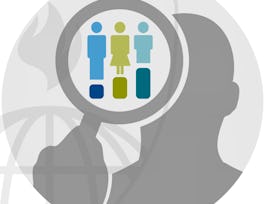Bias in healthcare delivery leads to worse patient care and patient outcomes. Advancing Health Equity: A Guide for Reducing Bias in Healthcare provides you an interactive bias training that teaches skills applicable to addressing enhanced public health guidelines and approaching the work of health equity.


Advancing Health Equity: A Guide to Reducing Bias in Healthcare
Taught in English
What you'll learn
Recognize the foundational connection between biases and health care management and policy.
Challenge your awareness, values, and actions on implicit and unconscious bias.
Skills you'll gain
Details to know

Add to your LinkedIn profile
4 quizzes
See how employees at top companies are mastering in-demand skills


Earn a career certificate
Add this credential to your LinkedIn profile, resume, or CV
Share it on social media and in your performance review

There are 4 modules in this course
Community Orientation is the ability to align one’s own and the organization’s priorities with the needs and values of the community, including its cultural and ethnocentric values and to move health forward in line with population-based wellness needs and national health agenda.
What's included
10 videos7 readings1 quiz1 discussion prompt
Organizational Awareness is ability to understand and learn the formal and informal decision-making structures and power relationships in an organization or industry (e.g., stakeholders, suppliers). This includes the ability to identify who the real decision makers are and the individuals who can influence them, and to predict how new events will affect individuals and groups within the organization.
What's included
6 videos5 readings1 quiz2 discussion prompts
Professionalism is the demonstration of ethics, sound professional practices, social accountability, and community stewardship; the desire to act in a way that is consistent with one’s values and what one says is important.
What's included
8 videos6 readings1 quiz1 app item1 discussion prompt
Accountability is our ability to hold people accountable to standards of performance; Change Leadership is to influence people towards the achievement of a set of goals; and Strategic Orientation is to consider implications of decisions in strategic ways that continually improve organizational long-term success.
What's included
11 videos7 readings1 quiz1 discussion prompt
Instructor

Offered by
Recommended if you're interested in Healthcare Management

Google Cloud

Johns Hopkins University

University of Michigan
Why people choose Coursera for their career




New to Healthcare Management? Start here.

Open new doors with Coursera Plus
Unlimited access to 7,000+ world-class courses, hands-on projects, and job-ready certificate programs - all included in your subscription
Advance your career with an online degree
Earn a degree from world-class universities - 100% online
Join over 3,400 global companies that choose Coursera for Business
Upskill your employees to excel in the digital economy
Frequently asked questions
Access to lectures and assignments depends on your type of enrollment. If you take a course in audit mode, you will be able to see most course materials for free. To access graded assignments and to earn a Certificate, you will need to purchase the Certificate experience, during or after your audit. If you don't see the audit option:
The course may not offer an audit option. You can try a Free Trial instead, or apply for Financial Aid.
The course may offer 'Full Course, No Certificate' instead. This option lets you see all course materials, submit required assessments, and get a final grade. This also means that you will not be able to purchase a Certificate experience.
When you purchase a Certificate you get access to all course materials, including graded assignments. Upon completing the course, your electronic Certificate will be added to your Accomplishments page - from there, you can print your Certificate or add it to your LinkedIn profile. If you only want to read and view the course content, you can audit the course for free.
You will be eligible for a full refund until two weeks after your payment date, or (for courses that have just launched) until two weeks after the first session of the course begins, whichever is later. You cannot receive a refund once you’ve earned a Course Certificate, even if you complete the course within the two-week refund period. See our full refund policy.



